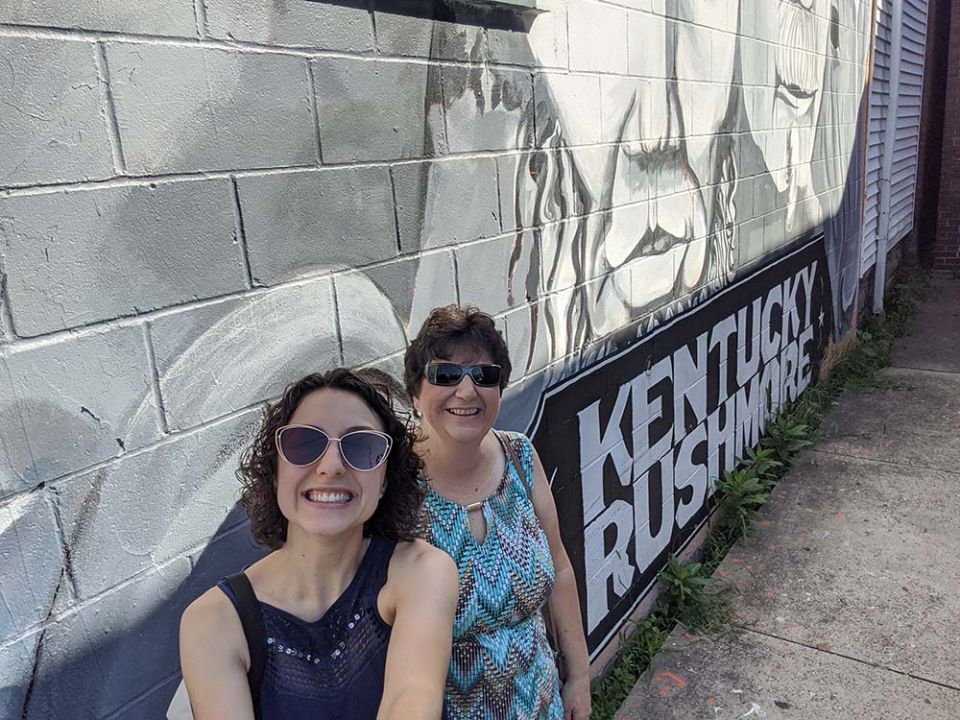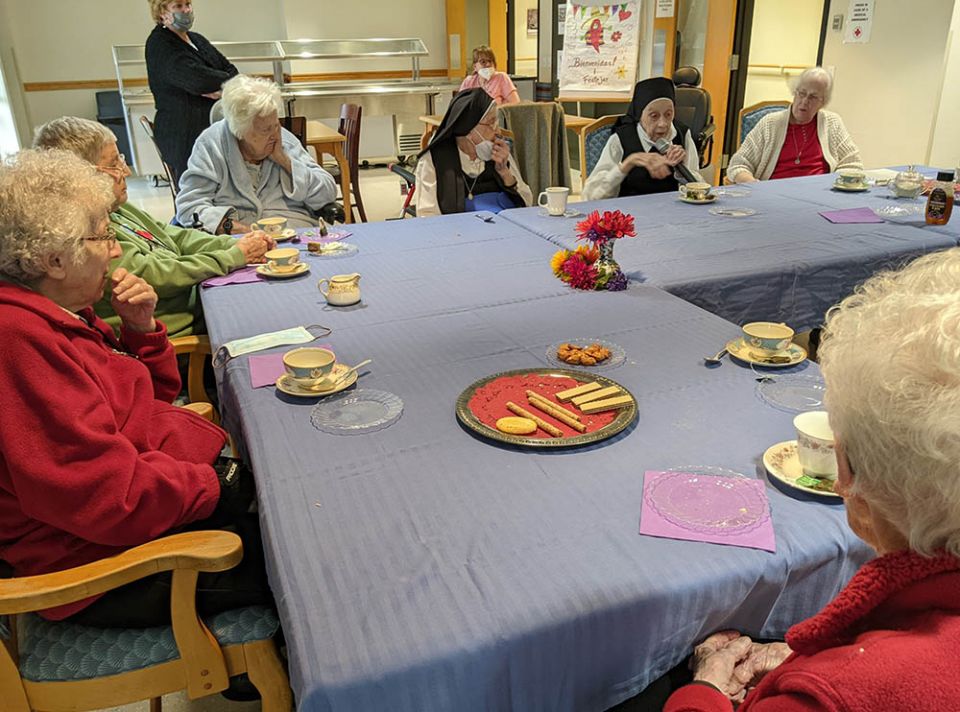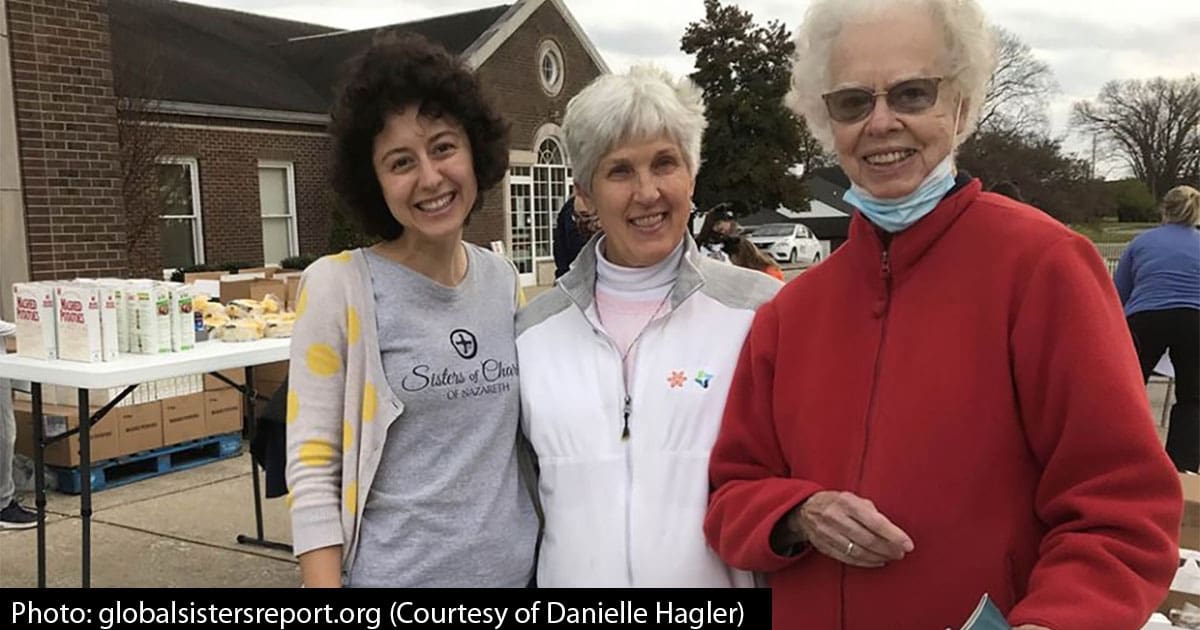Alongside Sisters of Charity, I slowed down and embraced the call to serve
In her essay “In the Service of Life,” Rachel Naomi Remen distinguishes service from “helping” and “fixing.” She writes:
Fundamentally, helping, fixing and service are ways of seeing life. When you help you see life as weak, when you fix, you see life as broken. When you serve, you see life as whole. From the perspective of service, we are all connected: All suffering is like my suffering and all joy is like my joy.
I have been pondering my own call to serve as I reflect on my blessings received through service alongside the Sisters of Charity of Nazareth, Kentucky, and as I discern the next steps in my journey. ‘Tis nearly the season for decisions to be made as to where I’ll be after this service year. I sure feel the pressure mounting!
Remen’s essay strikes me as especially powerful in this AmeriCorps Week, a time to celebrate the commitment of more than 250,000 Americans serving their communities through AmeriCorps, myself included.
Programs like AmeriCorps are not perfect. Take, for example, the exclusionary nature of a program in which not all volunteers are paid living wages — again, myself included — which this Medium post explains well. However, their commitment to empowering community success by partnering volunteers with community organizations, agencies, etc. is impactful, important and connective.
My own AmeriCorps program, the Notre Dame Mission Volunteers through the Sisters of Notre Dame de Namur, recently celebrated its annual midyear conference, a weekend to gather across service communities to build our capacity for ongoing, intentional service and to reflect on our service experiences midway through the service year. I am grateful to be part of a community that so highly prioritizes cura personalis, “care for the whole person,” in its volunteer program.

Julia Gerwe celebrates her (postponed) graduation from St. Louis University in August 2021, showing off her decorated graduation cap, which reads: “I was not made to be subtle.” “Subtle” is not a word most community members would use to describe Julia in her years of service that followed! (Courtesy of Hope Stratman)
I was reminded of my own call to serve during this conference and, further, how saying yes each day to living this life of intentional service has changed throughout my year and a half with the Sisters of Charity of Nazareth. (Shout-out to my program’s Second Year Learning Community for encouraging these reflections, as well.)
What drives me to serve, to “see life as whole,” changes nearly daily as my experiences shape me and my perspective widens. Every morning, I wake up with a new reason to say yes (though not always with the same levels of energy and enthusiasm), and every day, I am transformed by the serving.
I’ve been reminding myself lately to not let my work get in the way of my service. I am as much at Nazareth to develop community connections in environmental education and knowledge as I am to be with the sisters and community, building relationships and intentionally living among them. I have to remind myself that this current chapter of my life is different than some of my friends’ and peers’, and that is what makes it so sacred.
A year of service is certainly a growing, though niche, option for people my age. Living intentionally and simply, working in a field sometimes unrelated to one’s passions or field of study, and often earning below the poverty line is rather countercultural in American society.

Julia Gerwe, left, and her mother, Judy, make a stop at the “Kentucky Rushmore” mural in Louisville, on their way to visit Nazareth, Kentucky, for the first time in summer 2020 as Julia considered volunteering with the Sisters of Charity of Nazareth (Courtesy of Julia Gerwe)
Often, young people in the United States are inundated with a single, linear trajectory of success: graduate high school, attend college, get a well-paying job, and work your way up the corporate ladder. Perhaps volunteer at a food pantry or your church on the weekends or during the summer. But a lifestyle rooted in simplicity and service? It’s radically antithetical, really.
Perhaps this linear trajectory is being disrupted; after all, the widely debated “Great Resignation” is making obvious the reality that wage-stagnant, 9-to-5 work is neither sustainable nor desirable for young and old alike. At least, I hope this “Great Resignation” continues to call this cultural norm and reality into question.
What drives me to step out of this mold and to instead serve my community in this dedicated amount of time is nothing short of a call, a vocation, or an ability to “see life as whole” and interconnected.
I consider myself fortunate to have attended St. Louis University, a Jesuit university, for my undergraduate education. St. Louis University is rooted in its mission to “pursue truth for the greater glory of God and for the service of humanity” — a call I would say resonated with many students and widely encouraged service and engagement within our local community and beyond. Within my circles of influence, completing a post-graduation year of service was supported, normal and cool.
The onset of the COVID-19 pandemic in early 2020 upended the postgraduate plans I had made in my senior year, which involved traveling across the country for love, developing a certain trauma from the job search process in a stagnant and halted job market, falling out of love and traveling back across the country, and breakdowns upon breakdowns of “What do I do next?” What a ride — and I was privileged to have a family that could support me through it all.
Upon this endless questioning, though, I found myself returning to the still-small flame burning within, calling me to service. In this time of distress, insecurity and restlessness, I turned to a brand-new service program in an unknown small town doing work I certainly wasn’t qualified to do. We surely took a chance on each other!

A favorite part of Julia Gerwe’s service now is communing and being with the Sisters of Charity of Nazareth, Kentucky, which she did recently during this February’s “Tea, Cookies, and Conversation” event. (Courtesy of Julia Gerwe)
My call was laughably simple: to slow down and step out of the rat race of life to live intentionally and with purpose. I packed my bags, moved onto the property of a Catholic convent with sisters I didn’t know, and set off to find my answers. What I’ve gotten in return has been so much greater.
After a year and a half of living and serving at Nazareth, I still hear sisters say, “We’re so lucky to have you here, Julia,” as I call bingo numbers, share tea and enjoy coffee with them. (Isn’t it the most beautiful ministry?) My response is always the same: “To be honest, I’m even more lucky to be here.” And I mean it.
My day-to-day within these years of service has been flexible and fluid. I am grateful for the space this has created for me to dig into sustainability topics that interest me, build partnerships within my community and get to know the sisters. This gratitude often reflects the call I feel to continue serving my community here and now. A desire to intentionally share the sorrows and joys of this community fueled my commitment here and now motivates me to stay.
For me, this alternative life of service is a combination of hundreds of yeses each day. In answering this call to serve, another applicable question becomes clearer: Does who I am reflect how I see and engage with the world today?
In serving, the answer is always yes.
Julia Gerwe,
Julia Gerwe serves as ecological sustainability educational program manager with the Sisters of Charity of Nazareth.
Source: https://www.globalsistersreport.org/
Tags:







0 Comments